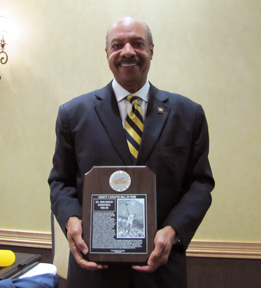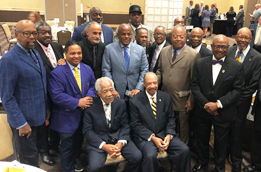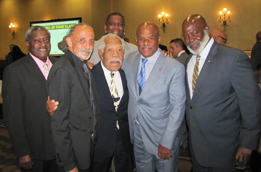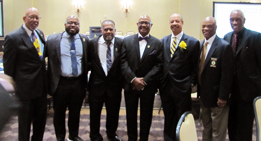By Fletcher Word
Sojourner’s Truth Editor

Finally!
After more than a half century of being overlooked, ignored and passed over, and pointedly so, former University of Toledo basketball star John Rudley was granted permission by his alma mater to enter the Varsity T Hall of Fame during a ceremony on Friday night, October 22 at the Perrysburg Hilton Garden Inn.
Rudley, accompanied by family, many old friends, fraternity brothers and local supporters who had endlessly petitioned UToledo to forgive the perceived transgressions and to honor an outstanding student-athlete, accepted the long overdue induction with grace and entered the Hall of Fame alongside six other outstanding student-athletes, all of whom are generations younger than he is.
Rudley also paid homage to those in attendance such as former Mayor Carty Finkbeiner (a sports assistant at UT during Rudley’s years there), fellow fraternity brother Vince Davis and African American Legacy Project Director Robert Smith, all of whom led the effort to ensure his induction.
Six other former student athletes were inducted:
- Kate Bean McCauley, a volleyball athlete from 2003 to 2006, dominates the Toledo volleyball record book and led the team to its first ever semifinals in the MAC tournament. McCauley is the only Rocket volleyball player to be named to the CoSIDA Academic All-America First Team graduating with a 3.978 grade point average. She is a nurse in Louisville.
- Jeremiah Detmer was a kicker with the football team from 2011 to 2014 and was the 2013 MAC Special Teams Player of the Year. That season he connected on 19 of 20 field hoals and 44 of 45 extra points. He was a three-time Academic All-MAC selection and is currently completing his training to be a Toledo firefighter.
- Greg Manz, an offensive lineman, played football from 2010 to 2014, was named first team All-MAC in his senior year and was named a second-team All-American by the Football Writers Association of America – the first Rocket offensive lineman to be so honored since Dan Bukovich in 1934. Manz was an Academic All-MAC selection four times. He played for six seasons with the NFL’s Houston Texans and is currently on the Miami Dolphins’ team.
- Jessica Popiel Stone, a golfer, was a member of the very first Rockets’ women’s team – from 1996 to 1999. She was the MAC Player of the Year in 1999, as well as a WGCA All-American Scholar in 1997 and 1998. Stone was the first Rocket to compete in an LPGA Tour event, playing in the Jamie Farr Classic in 1999.
- Chris Wallace played quarterback for the Rockets from 1995 to 1998 leading the team to division titles his last two seasons during which he threw for 44 touchdowns, 5,454 yards. His athletic exploits led to a No. 18 ranking for the Rockets in the AP poll. After UT, Wallace played 18 seasons of professional arena football setting league records in career touchdowns and passes completed.
- Inma Zanoguera, 2011 to 2015, played was a three time All-MAC honoree who played for women’s basketball teams that won an average of 22 games per season. She earned first team All-MAC honors as a senior and led the team in scoring, rebounding an assists. And was selected as one of 30 NCAA women’s basketball nominees for the 2014-2015 Senior CLASS Award. She was twice an Academic All-MAC selectee. She played professional basketball in Italy after graduation and recently won the Sahara Marathon in his first attempt at the 26.2 mile event.

But John Rudley was the star of the evening. The point guard for Toledo from 1965 to 1969, who had been shut out by the university for over five decades received a welcome home and the long-time grudge was forgotten or, at least, overlooked.
The University of Toledo’s grudge against John Rudley, started in the 1960’s.
It was a trying time for athletes – the second half of the 1960s. When Muhammad Ali spoke up, became a member of the Nation of Islam and denounced racism and the Vietnam War, a standard of behavior was set. A symbol of heroism has been accepted, almost universally.
Within a few years, Ali regained the chance to continue fighting, gained and reclaimed the heavyweight crown and earned plaudits as an American hero.
Tommie Smith and John Carlos raised their fists in the air on the Olympic podium when the U.S. National Anthem was being played. As the decades have passed, that symbol of protest against racism has become an iconic portrait of two heroes’ decision to sacrifice everything for a cause much larger than their personal ambitions.

Football’s Jim Brown and basketball’s Bill Russell spoke out against oppression, injustice and racism and spent time with protesters, such as Ali, seconding his calls for change. Years later, Russell and Brown, both in their pro sports’ Halls of Fame, are remembered fondly for their athletic exploits as well as their involvement in various causes.
However, for John Rudley and his teammates, who formed the core of a University of Toledo basketball team that would go 23-2 in 1966-67 and win the MAC Championship, no such future athletic plaudits were forthcoming. Indeed that 1966-67 team, during Rudley’s sophomore year, has been called the best team that has ever taken the court at UT and, for so many at the university, until this weekend, it’s as if they never existed.
Rudley, a point guard and team captain, and one of his teammates, sat out a game in 1969, his senior year, to protest the actions of their coach, Bob Nichols, who suspended a teammate, Bob Miller, for missing class. Nichols was white and had been struggling for several years with that team, Rudley recalled later, trying to balance the playing time of his white and black players – a very tricky proposition in the 60’s.

For Nichols the dilemma was particularly poignant because he was the one who recruited Rudley and the other black players and then tried over time, as the black players saw it, to minimize their playing time, catering to the sensibilities of the time.
Nichols had brought in Rudley, an outstanding point guard from Benton Harbor who had led his team to two undefeated seasons and two Michigan state championships; John Brisker, from Detroit, who would go on to play professionally with the ABA along with a brief stint in the NBA; Calvin Lawshe from Macomber; Bob Miller from upstate New York and Steve Mix, a standout at Toledo’s Rogers High School who would eventually play in the NBA for 14 seasons, including on some championship teams. All but Mix were black.
Those Super Sophs, when they won that championship in 66-67, frayed a bit by the time they were seniors. Brisker, a volatile mix at best with Nichols, says Rudley, had left the team. Lawshe had suffered a serious knee injury and his career was over. In early 1969, the coach learned that Bob Miller had been skipping classes, confronted him on that fact, ordered him to start attending and suspended him from the team when he learned that Miller had skipped again.
Rudley joined protesters at mid court before the next game – several dozen black students and teammate Jim Miller – and walked out of the gym, missing one game. The team finished in the doldrums – 13-11 and fifth in the MAC.
Rudley went on to graduate school, a career as a certified public accountant, a second stellar career in academia as the interim president of the University of Houston and then an eight-and-a-half-year tenure as president of Texas Southern University, retiring three years ago.
Bob Miller did not graduate – deprived as he was of about two dozen credits; Rudley, despite his outstanding years as team leader, point guard, impressive scorer and assist leader, (“one of the best point guards I ever had a chance to play with,” said Mix), never made the UT Hall of Fame – a Hall with about 300 members – and the 1966-67 teams did not even have its photograph posted.
After Rudley left Toledo, diploma in hand, he didn’t return for decades and didn’t speak with Nichols for over 30 years. Reconciliation did arrive in the early 2,000s, and the pair stayed in touch. The Nichols family became champions of Rudley’s induction into the Hall.
On Friday evening, as Rudley acknowledged, all was forgiven. Steve Mix, among others, sat in attendance as Rudley received the honor he has so long deserved and an appreciative audience welcomed home the former point guard/retired university president.
